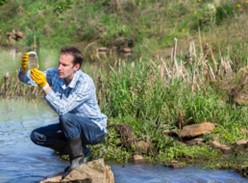Toxic pressure of chemical pollutants in vulnerable areas

Toxic pressure?
The production and use of chemicals can lead to the release of toxic compounds. If these end up in water or soil, they can harm the environment. The more chemicals enter the environment, the greater the so-called toxic pressure. This can harm plants, animals and ecosystems in vulnerable areas such as nature reserves. In recent years, there has been growing concern in society about mixtures of chemicals in the environment, such as those emitted by industry, agriculture and households. However, relatively little research has been done on their effects on vulnerable areas.
Special attention for vulnerable areas
The key scientific question to be answered for this is: how can chemical pollution with ambient mixtures be characterised in specific protected or vulnerable areas, and does the pollution give rise to a toxic pressure, causing impacts? Given the observations and concerns on exposure to and effects of chemical pollution in ecosystems, the Dutch government commissioned a research project on determining toxic pressure in vulnerable areas.
Step by step guideline
The Dutch National Institute for Public Health and the Environment (RIVM) now has developed a framework to assess what the presence of these chemicals means for these areas. A guideline describes the approach step by step. The approach is suitable for determining toxic pressure in soil and surface water. For both, case studies were conducted to improve and illustrate the approach. The approach merges three existing methods (chemical analyses, effects of mixtures on plants and animals, and ecological field work) from scientific literature. Practicality has also been considered. RIVM recommends testing how well the approach and guideline work in practice and to develop them further, for example to determine toxic pressure in groundwater and organisms as well.
The complete study “Characterisation of toxic pressure of chemical pollutants in vulnerable areas Methods and guidance for operational characterisation” can be found here.
EmConSoil coordinator
- Adres
- Stationsstraat 110
2800 Mechelen
Route en bereikbaarheid - Telefoon
- +32 15 284 284
